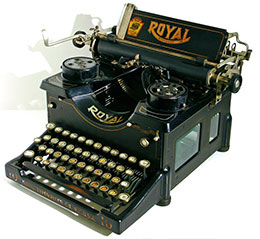 Currently working on a new book (untitled) and did what I always have to do: stop working on the computer, print out what I have done, and work on a real page, red pen in hand. It makes (for me) a huge difference
Currently working on a new book (untitled) and did what I always have to do: stop working on the computer, print out what I have done, and work on a real page, red pen in hand. It makes (for me) a huge difference
I see things on the printed page I don’t see on the computer screen. The rhythm of my prose becomes much clearer on the printed page. I catch duplicated words with greater ease. I can make bigger cuts than I can when on the computer. I have a greater sense of the whole book, its flow and scope.
I’m not sure why. Sometime I think it is because the printed page has greater affinity with a printed book. Sometimes I think it’s the tactile sense of writing. Or that my eyes adjust, or achieve greater clarity on the printed page. Maybe I just like print better. Maybe it’s my age—the digital world being relatively new. There are times I really miss my old Royal typewriter.
I do know that when I read a digital book (Nook, Kindle, etc.) my eyes slide over the device. It’s as if the words are coated with Teflon. I stick more to a printed book.
You writers out there, does it matter how (the mechanics) you see your words, write your words? I’m curious.
12 thoughts on “I miss my old Royal typewriter”
I’m grateful for the conveniences a computer offers, but I definitely agree with you about editing more effectively from the printed page.
I do all my story planning and outline, including, rough scenes longhand. Then dictate, speech-to-text, and/or type it and expand. For edits and rewrite I always work from a printed copy for at least two passes through and make handwritten notes for rework or new scenes to write. Like you, I see things more clearly on paper while sitting with pencil in hand. My thoughts flow more naturally.
“…when I read a digital book my eyes slide over the device. It’s as if the words are coated with Teflon.” This is a perfect description of what happens to me, as well. I print regularly–I see things better and can make things better, but it is also reassuring somehow that even if the pages are filled with drivel, it’s getting SOMEWHERE. It looks (sort of) like the page of a book etc. I can’t imagine working on a type-writer at this point, but a combination of computer and paper works for me.
When plotting, I have to feel the words flowing from a pen over paper. I usually write the first page long hand, as well. It helps the story come alive to me. (A method I again use if I get stuck.)
After the first draft or two, I print out the story. It ‘s also easier for me to catch things on paper than the computer screen. Plus, it’s satisfying to physically hold a completed project.
I need a computer to actually write, but I prefer to brainstorm on the printed page.
I also prefer printing the pages and writing on them. There is something about the physical pages being in your hand that make it easier to work with. I can quickly go from one page to the next. Heaven bless the inventor of the keyboard since my handwriting is getting more atrocious with age, but I must have my neatly typed words in my hand when looking for flow and clarity. I can take them and work on them anywhere. Laptop or computer not so convenient.
Interesting comments. Seems we all need paper and pen or pencil (my preference). I go back and forth between computer screen and printouts, several times in a day. Use way too many of those overpriced printer cartridges, but at least I recycle.
I write by hand first, and then I type it on the computer. Then I print it out to edit by hand. At this point I usually write the story out again by hand and then type it on the computer. Longhand is the best method for me.
I write my first draft on computer fast and with little editing. Revising is a combination of on screen and on paper. I agree that I see more and better on single sheets of paper.
Now that you’ve finished one book and are starting another, I’d be interested in knowing how you do this. What’s your process? Do you have the new book outlined and ‘waiting in the wings’ at all times, or do you go to the typewriter and work your way into a new story that way. Any tips? For me, there is such a completely different mind set when transitioning from a full bodied completed manuscript to the sparse bones of a new story. It’s sort of scary plus it feels like completely different writing muscles are required. I hope you might consider addressing this in a future post. Many thanks for all you share.
I plan the story and write the first draft of a chapter on a lined “legal” pad with a flowing black pen. This pen seems to let the words flow out of my mind. Then I type the chapter into my computer, and, like you, print it out and proofread, using a red pen. That first draft is the hardest but revisions are the reward.
These reflections are all different, but have an interesting similarity, insofar as there seems to be a constant transfer from screen to page, page to screen, what ever. Maybe we should call writing a process of shifting restless words.